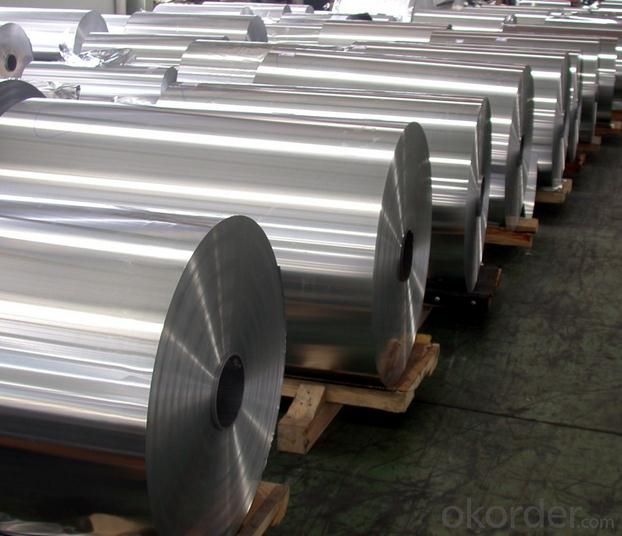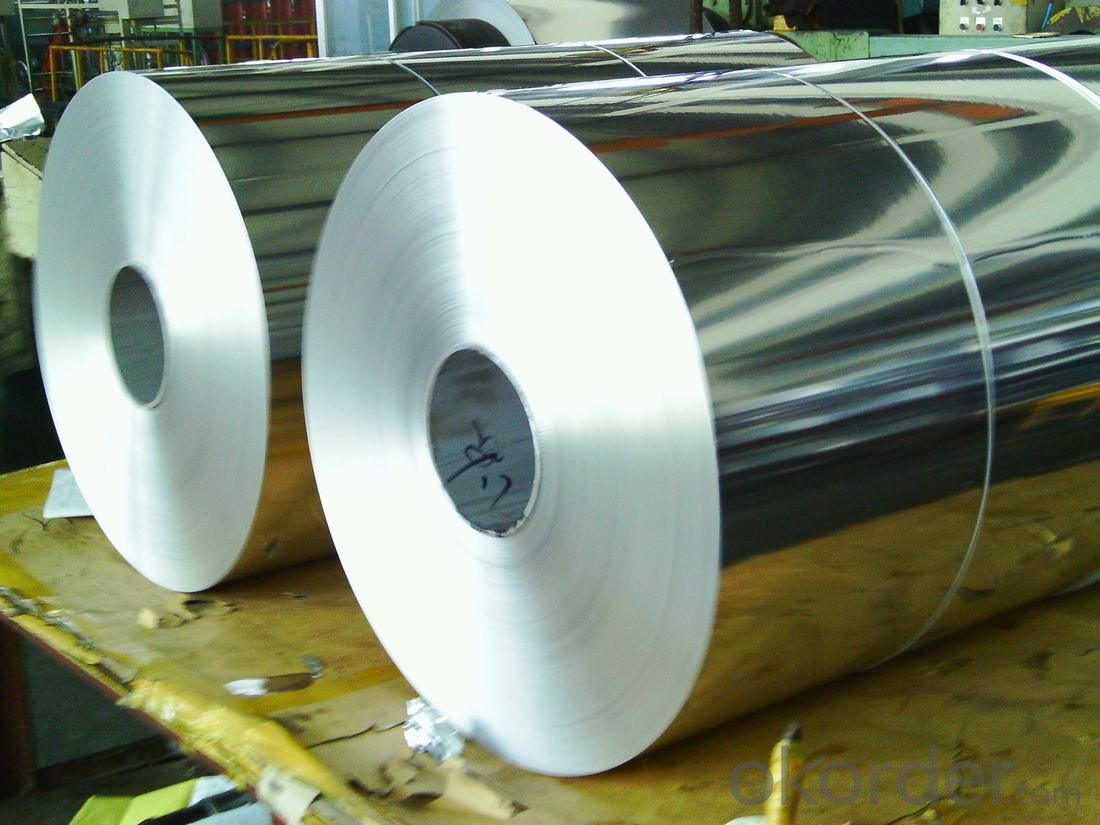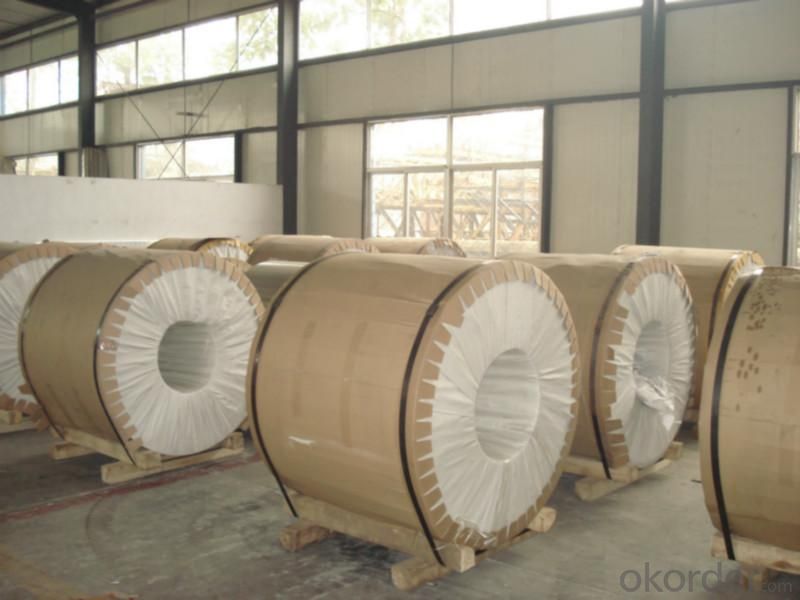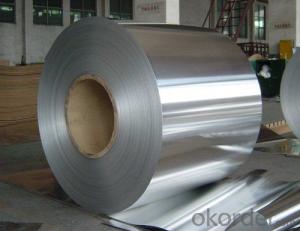5005 Alloy H22 Aluminum Rolled Sheet Aluminium Coil
- Loading Port:
- Shanghai
- Payment Terms:
- TT OR LC
- Min Order Qty:
- 5 m.t.
- Supply Capability:
- 500 m.t./month
OKorder Service Pledge
OKorder Financial Service
You Might Also Like
Item specifice
5005 H22 Aluminum Rolled Sheet Aluminium Coil
aluminum coil specifications:
1) Alloy :1050, 1060,1100, 3003 3004 3105 3A21 5005 5052 etc
2) Temper: O/H12/H14/H1/H18/H32/H34/H36/H38//H111/H112/H116/H321/T6/T651/T3/T351 etc
3) Thickness: 0.1mm to 6mm
4) Width:20mm to 3300mm
5)Coil weight: 100kgs to 6 tons depends on actual requirement
6)Core material: Aluminum or paper
7)Coil Inner diameter: 75mm, 150mm, 200mm, 300mm, 405mm, 505mm or as required
8) Protective film can be added
item | 3003 Aluminum coil | |
Standard | GB/T3190-2008,GB/T3880-2006,ASTM B209,JIS H4000-2006,etc | |
Material | 1060,1050,1100 3003,3103,3004,3005,3105 5052, 5454,5754 | |
Size | Thickness | 0.5mm-3.5mm |
Width | 800-1500mm | |
Weight/Roll | About 1.5MT/3MT | |
Quality control | Mill Test Certificate is supplied with shipment, Third Part Inspection is acceptable. | |
Surface | Bright, polished, hair line, brush, checkered, embossed, etc | |
Trade terms | Price term | ,FOB, CNF, CIF, etc |
Payment Term | TT,L/C | |
MOQ | 2MT | |
20 GP Capacity | About 20-25MT | |
Delivery time | 1.The products will delivery immediately after receiving the payment. 2.According to the order quantity, prompt delivery. | |
Export to | Ireland,Singapore,Indonesia,Ukraine,Spain,Canada,USA,Brazil,Thailand,Korea,Iran,India,Egypt,Kuwait, Oman,Viet Nam, South Africa, Dubai, Russia, etc | |
Package | Stick blue film→plastic film→waterproof paper→1~2 tons on a export standard pallet(corner protection) | |
Application | 1)Further making utensil.2)Solar reflective film3)The appearance of the building4)Interior decorating:ceilings,walls,etc.5)Furniture cabinets6)Elevator decoraction7)Signs,nameplate,bags making.8)Decoration inside and outside the car9)Household appliances:refrigerators,microwave ovens,audio equipment,etc.10)The consumer electronics:mobile phones,digital cameras,MP3,etc. | |



- Q:Can aluminum foil coil be stores for a long time?
- It is ok within one or two years, but for five or six years, it will be oxidized.
- Q:How do aluminum coils compare to other metals in terms of strength?
- Compared to numerous other metals, aluminum coils possess an exceptional strength-to-weight ratio. Although not as robust as steel, aluminum is both lighter and more pliable, rendering it a favored option in diverse applications. Aluminum coils are capable of enduring substantial forces without fracturing or distorting, thereby rendering them suitable for a broad array of industries, encompassing automotive, aerospace, and construction. Furthermore, these coils exhibit commendable resistance to corrosion, thereby bolstering their longevity and durability. However, it is crucial to acknowledge that the strength of aluminum may fluctuate depending on the chosen alloy and temper. Thus, specific comparisons ought to be conducted based on the particular application and stipulations.
- Q:What is the tensile strength of an average aluminum coil?
- The specific alloy and temper of aluminum can cause variations in the tensile strength of an average aluminum coil. On average, aluminum coils possess a tensile strength between 13,000 and 30,000 pounds per square inch (psi). It is worth noting that this range is an approximate estimation and the actual tensile strength can be affected by factors like the manufacturing process, alloy composition, and any heat treatments administered to the aluminum.
- Q:How are aluminum coils measured and specified?
- Several key factors are taken into account when measuring and specifying aluminum coils. Gauge or millimeters are typically used to measure the thickness of the coil, which determines its strength and durability. Thicker coils are more robust. The width of the coil, measured in inches or millimeters, is another important specification. It determines the size and coverage area of the coil, with wider coils offering greater coverage. The length of the coil is also crucial and is typically measured in feet or meters. It determines the amount of material available for a specific project. Longer coils are often preferred as they minimize the need for joints during installation. The aluminum alloy and temper used in the coil are specified as well. Different alloys have different mechanical and chemical properties, making them suitable for specific applications. The temper, which refers to the heat treatment process applied to the aluminum, affects its hardness and flexibility. The weight of the coil is an important consideration and is typically measured in pounds or kilograms. It determines the handling and transportation requirements for the coil. Lastly, the surface finish of the coil is specified. Common finishes include mill finish, which is untreated, and coated finishes such as painted or anodized. The surface finish affects the appearance and corrosion resistance of the coil. Overall, the measurement and specification of aluminum coils involve factors like thickness, width, length, alloy, temper, weight, and surface finish. These specifications ensure that the coils meet the desired requirements for various applications.
- Q:What are the common applications of aluminum coils?
- Due to their unique properties and versatility, aluminum coils are extensively used in various industries. They have numerous applications, some of which are highlighted below: 1. HVAC Systems: Aluminum coils play a crucial role in heat transfer in air conditioning and refrigeration systems. Their lightweight nature and excellent thermal conductivity make them an ideal choice for these purposes. 2. Transportation Industry: The automotive and aerospace industries commonly employ aluminum coils in the manufacturing of radiators, condensers, evaporators, and other heat exchange components. Aluminum's high strength-to-weight ratio helps in reducing the overall vehicle weight, resulting in improved fuel efficiency. 3. Construction Sector: The construction industry widely utilizes aluminum coils in the production of gutters, downspouts, roofing, and cladding materials. Aluminum's corrosion resistance and durability make it the preferred choice for outdoor applications that require long-lasting performance. 4. Electrical Industry: Aluminum coils are excellent for the production of cables, wires, transformers, and power distribution systems due to their exceptional electrical conductivity. 5. Packaging Industry: Aluminum coils are extensively used in producing various packaging materials, including cans, foils, and containers. Aluminum's ability to create a barrier against moisture, light, and oxygen makes it ideal for preserving the freshness and quality of food and beverages. 6. Marine Applications: The marine industry relies on aluminum coils for the manufacturing of boats, ships, and other offshore structures. Aluminum's resistance to corrosion in saltwater environments makes it suitable for these applications. 7. Industrial Equipment: Aluminum coils are utilized in various industrial equipment, such as heat exchangers, condensers, and evaporators. Their thermal conductivity and corrosion resistance properties enable efficient heat transfer. In conclusion, aluminum coils find widespread use in several industries, including HVAC, transportation, construction, electrical, packaging, marine, and industrial equipment. Their lightweight nature, excellent thermal conductivity, corrosion resistance, and durability make them highly desirable for a variety of applications.
- Q:How are aluminum coils tested for quality and performance?
- Aluminum coils are tested for quality and performance through various methods including visual inspections, dimensional measurements, mechanical property testing, and corrosion resistance testing. These tests help ensure that the coils meet specific standards and requirements for their intended applications.
- Q:How do aluminum coils compare to other types of metal coils?
- Aluminum coils have several advantages and disadvantages when compared to other types of metal coils. One of the main advantages of aluminum coils is their lightweight nature. Aluminum is significantly lighter than other metals such as copper or steel, making it easier to handle and transport. This lightweight property also makes aluminum coils more cost-effective in terms of shipping and installation. Furthermore, aluminum coils are highly resistant to corrosion, which is a significant advantage in many applications, especially in humid or corrosive environments. This resistance to corrosion makes aluminum coils suitable for outdoor use, such as in air conditioning systems or refrigeration units. Additionally, aluminum coils have excellent thermal conductivity, allowing for efficient heat transfer. This property makes them highly efficient in heat exchange applications, such as in HVAC systems or automotive radiators. However, aluminum coils also have some drawbacks. Compared to copper coils, aluminum coils have lower electrical conductivity, which can result in higher energy consumption and reduced efficiency in certain applications. Additionally, aluminum is a softer metal than copper or steel, which means that aluminum coils may be more susceptible to damage or bending. In summary, aluminum coils offer advantages such as lightweight, corrosion resistance, and thermal conductivity. However, they may have lower electrical conductivity and be more prone to damage compared to other types of metal coils. The choice between aluminum coils and other types of metal coils ultimately depends on the specific application and its requirements.
- Q:Can aluminum coils be used for sound insulation purposes?
- Yes, aluminum coils can be used for sound insulation purposes. Aluminum has excellent sound-dampening properties due to its density and ability to absorb and attenuate sound waves. Aluminum coils can be used in various applications such as in HVAC systems, automotive industry, and construction to reduce noise transmission. The coils can be installed in walls, ceilings, or ductwork to create a barrier that blocks or absorbs sound vibrations, thus improving sound insulation and reducing noise levels. Additionally, aluminum coils are lightweight, durable, and resistant to corrosion, making them a reliable choice for sound insulation solutions.
- Q:What is the maximum coil width available?
- The maximum available coil width is contingent upon various factors, including the manufacturing capabilities of the supplier or manufacturer in question. In broad terms, coil widths can span from a few millimeters to several meters. The utmost width is typically dictated by the machinery employed in coil production and the constraints imposed by the size of the raw materials being handled. It is advisable to engage in consultation with specific suppliers or manufacturers to ascertain the maximum coil width feasible for a given product or application.
- Q:Can aluminum coils be used in outdoor or exposed applications?
- Yes, aluminum coils can be used in outdoor or exposed applications. Aluminum is known for its excellent corrosion resistance, which makes it suitable for outdoor use. It forms a protective oxide layer on the surface that prevents further oxidation. Additionally, aluminum is lightweight, durable, and has a high strength-to-weight ratio, making it a popular choice for outdoor applications where weight and durability are important factors. Aluminum coils are often used in outdoor applications such as HVAC systems, roofing, gutters, and siding, as they can withstand exposure to various weather conditions without compromising their performance or appearance.
1. Manufacturer Overview |
|
|---|---|
| Location | |
| Year Established | |
| Annual Output Value | |
| Main Markets | |
| Company Certifications | |
2. Manufacturer Certificates |
|
|---|---|
| a) Certification Name | |
| Range | |
| Reference | |
| Validity Period | |
3. Manufacturer Capability |
|
|---|---|
| a)Trade Capacity | |
| Nearest Port | |
| Export Percentage | |
| No.of Employees in Trade Department | |
| Language Spoken: | |
| b)Factory Information | |
| Factory Size: | |
| No. of Production Lines | |
| Contract Manufacturing | |
| Product Price Range | |
Send your message to us
5005 Alloy H22 Aluminum Rolled Sheet Aluminium Coil
- Loading Port:
- Shanghai
- Payment Terms:
- TT OR LC
- Min Order Qty:
- 5 m.t.
- Supply Capability:
- 500 m.t./month
OKorder Service Pledge
OKorder Financial Service
Similar products
New products
Hot products
Hot Searches
Related keywords





























